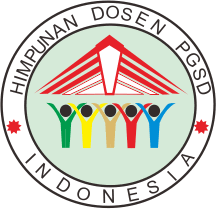Penerapan model pembelajaran Problem Based Learning untuk meningkatkan kemampuan memahami materi peralatan ringan dan berat pekerjaan konstruksi siswa kelas XI DPIB SMK Negeri 1 Klego tahun pelajaran 2021/2022
Abstract
The lack of application of student-centred learning causes students to lack understanding of the material they are studying. The impact is the low understanding of students' abilities. Therefore, this classroom action research aims to apply a student-based learning approach using a problem-based learning model to improve students' understanding skills. The method used the Kemmis & Taggart Model Classroom Action Research that every cycle in the research consists of four stages. It is planning, action, observing, and reflecting. This research is carried out in 2 cycles, each containing 2 lessons. The data was from the results of students' cognitive test questions. Based on the results of classroom action research carried out in 2 cycles, it can be concluded that the application of the problem-based learning model can improve the ability to understand the material for Heavy and Light Equipment in Construction Work for class XI students of SMK Negeri 1 Klego. It is proven by the increase in student learning outcomes each cycle. In the first cycle, there was an increase in the percentage of completeness from 40% (pre-cycle) to 66% with an average of 75.4 (sufficient category) after only 69 previously. Then in the second cycle, there was an increase in student completeness to 83% with an average score is 81.7 (good category).
Keywords
Full Text:
PDFReferences
B. S. Bloom, M. D. Engelhart, E. J. Furst, W. H. Hill, and D. R. Krathwohl, “The Classification of Educational Goals,” Taxon. Educ. Object., pp. 62–197, 1956.
Y. Ariyana, A. Pudjiastuti, R. Bestary, and Z. Zamromi, “Buku Pegangan Pembelajaran Keterampilan Berpikir Tingkat Tinggi Berbasis Zonasi,” Direktorat Jendral Guru dan Tenaga Kependidikan, pp. 1–87, 2018
Y. P. Sari, Sunaryo, V. Serevina, and I. M. Astra, “Developing E-Module for fluids based on problem-based learning (PBL) for senior high school students,” J. Phys. Conf. Ser., vol. 1185, no. 1, 2019, doi: 10.1088/1742-6596/1185/1/012052.
E. Rohaeti, Pembelajaran Inovatif Matematika Bernuansa Pendidikan Nilai dan Karakter. Bandung: PT. Refika Aditama, 2019.
C. De Simone, “A fault detection method for a three-tank system,” Int. J. Humanit. Soc. Sci., vol. 4, no. 12, 2014.
S. Ramdiah, H. Abidinsyah, and R. Mayasari, “Problem-based learning : Generates higher-order thinking skills of tenth graders in ecosystem concept,” JPBI (Jurnal Pendidik. Biol. Indones., vol. 4, no. 1, pp. 29–34, 2018, doi: 10.22219/jpbi.v4i1.5490.
M. Surur, I. N. S. Degeng, P. Setyosari, and D. Kuswandi, “The effect of problem-based learning strategies and cognitive styles on junior high school students’ problem-solving abilities,” Int. J. Instr., vol. 13, no. 4, pp. 35–48, 2020, doi: 10.29333/iji.2020.1343a.
I. Richard and Arends, Learning to Teach, Tenth Edition. New York: McGraw-Hill Education, 2015.
Z. A. Ni’mah, “Urgensi Penelitian Tindakan Kelas Bagi Peningkatan Profesionalitas Guru: Antara Cita dan Fakta,” Realita, vol. 15, no. 2, pp. 1–11, 2017.
R. Harisandy, “Peningkatan Hasil Belajar Siswa Kelas Xi Pada Mata Pelajaran Pengendali Daya Tegangan Rendah Smk 1 Sedayu Melalui Model Kooperatif Tipe Gi (Group Investigation),” p. 27, 2015.
Siswanto, Penilaian dan Pengukuran Sikap dan Hasil Belajar Peserta Didik. Kelaten: Bosscript, 2017.
T. Sarpong, F. A. Sarpong, and A. O. Asor, “The Influence of Activity-Based Teaching Method Used in Teaching Social Studies on Students Retention and Academic Performance: A Quasi-Experimental Study of Selected Junior High School Students in Sekyere South District of Ashanti Region, Ghana,” Open J. Soc. Sci., vol. 08, no. 12, pp. 238–254, 2020, doi: 10.4236/jss.2020.812018.
B. Hergenhahn and M. H. Olson, Theories of Learning, 7th ed. Jakarta: Prenada Media Group, 2008.
D. H. Schunk, Learning Theories: An Educational prespective, 6th ed. Yogyakarta: Pustaka Pelajar, 2012.
A. Mahmudi, “Pembelajaran Kolaboratif [Collaborative learning],” Pembelajaran Kolaboratif, pp. 1–11, 2006, [Online]. Available: http://eprints.uny.ac.id/11996/1/PM - 57 Ali Mahmudi.pdf.
M. Binkley, O. Erstad, J. Herman, S. Raizen, M. Ripley, and M. Rumble, “Draft White Paper 1 Defining 21st century skills,” 2010.
Refbacks
- There are currently no refbacks.



